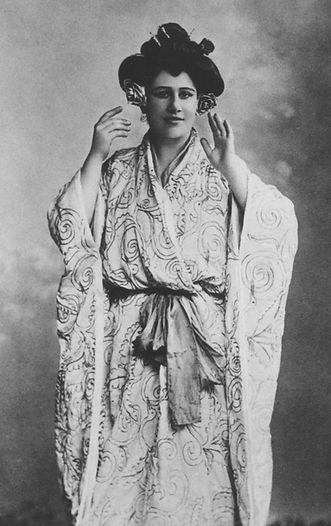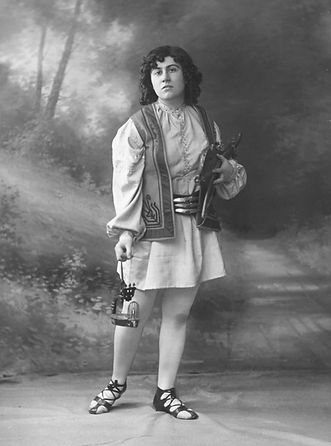
Emmy Destinn
.jpg)


The greatest Czech diva of all time (1878-1930)
Even now, 92 years after her death, thanks to the surviving recordings, her rich, dark, passionate, dramatic soprano is still capable of captivating admirers both in her native Bohemia and all around the world. Emmy Destinn was a hugely admired singer who performed in all the world's great opera houses. During her triumphant career, Destinn - universally known as the ‘divine Emmy’ - performed in over eighty roles; her interpretations of Aida, Tosca and Salome, to quote a few of her best known roles, were considered unparalleled by those who heard her. In the 1900s she was the highest paid female singer at the Metropolitan Opera.
A quintessential femme fatale, she was a flamboyant but tragic figure. Her love affairs were legendary. Among her many admirers was the great Enrico Caruso, whom she partnered on stage on 47 occasions, Arturo Toscanini, Artur Rubinstein and the French baritone Dinh Gilly, who learnt Czech to be able to sing with her in Prague - although that eventually meant an internment by the Germans there during the First World War.
Emilie Pavlína Kittlová was born into an affluent Prague family on 26 February 1878. Her mother Jindřiška was a fine singer who had appeared at the Opera Comique in Paris and her father Emanuel Kittl was a well known Czech philantropist who encouraged Ema’s musical studies. Ema played the violin from an early age and was considered a child prodigy, giving her first public concert at eight. By twelve her voice begun to show a great promise and she begun to study singing under the singing coach Marie Loewe-Destinn, whose name she later adopted. She also took acting lessons with the celebrated Czech actress Otýlie Sklenářová-Malá who considered her a very gifted pupil. Ema had the ability to learn a piece of music virtually on first hearing and acquired a solid vocal method so rapidly that her teacher considered her ready for a debut at twenty.
Her entry onto the operatic scene was not without problems. Having been rejected by by the Prague‘s National Theatre, Dresden’s Semper Opera and Berlin‘s Theatre des Westens, twenty year old Ema, known by then as Emmy Destinn caused a sensation with her debut in July 1898 in the role of Santuzza in Cavalleria Rusticana at Berlin’s Kroll Theatre, thus setting the tone for the start of her career. Three years later, in 1901, she was invited by Cosima Wagner to Bayreuth where she received a rapturous reception as Senta in the very first production of the Flying Dutchman.
Following her phenomenal debut, in 1905 Richard Strauss asked Destinn to create the eponymous role of Salome. Despite the opera’s great success in Berlin and Paris, conducted by the composer himself, Destinn sang in just twelve performances, considering the role too heavy for her voice.
Destinn's close links with the Royal Opera House, Covent Garden in London began in May 1904, when she made her first appearance as Donna Anna in Don Giovanni. The following year Giacomo Puccini chose her to sing the title role in Madama Butterfly at its London premiere. During the twelve consecutive seasons there she made 231 appearances in 18 operas; her roles included sang Santuzza, Nedda, Tosca, Elsa, Gioconda, Carmen, Tatiana to name a few. She created the role of Tess in d’Erhlagher’s Tess of the D'Urbervilles and performed her legendary Aida at the coronation of King George V in 1911, in an all star production featuring also Nellie Melba and Lisa Tetrazzini.
Emmy Destinn gave her first performance at the Metropolitan Opera in New York in 1908 as Aida, opposite Caruso, with Toscanini conducting. She became a star and the highest paid female singer there. During her ten glorious seasons at the Met she gave more than 300 performances in 24 operas. She created the role of Minnie in La Fanciulla del West which Puccini wrote with her in mind, premiered in 1910, with 'the divine Emmy' singing alongside Caruso, Gilly and Toscanini. In 1909 she persuaded the Met to stage Smetana’s Bartered Bride, albeit in German. She sung Mařenka under the baton of Czech-born Gustav Mahler.
Her talents were many and varied - and not only musical. Destinn also wrote plays, novels, short stories, librettos, and poetry; painted on canvas and porcelain; and translated and composed songs. She wrote her first play at the age of 16, and by 18 had followed that with three more. Her 1915 novel Dr. Casanova was based on her own experiences during the early years of her operatic career. The most significant of her works, however, is the 1924 novel In the Shadow of the Blue Rose, along with her play Rahel and a collection of poems, Storm and Silence. Her sharp wit, sense of humour and ability to write vividly about any situation is evident in her vast correspondence. She spoke five languages fluently and wrote her literary work in Czech and German.
Although she travelled the world she loved her country above all. Her fierce patriotism, however, had a fateful effect on her career. During the Met’s 1915-16 season she returned to the war torn Europe, against the advice of her friends, carrying with her messages for the Czech resistance, a move which almost cost her life. In Prague, she refused to sing for the Austro-Hungarian troops and as a result was placed under a house arrest for two years. Even this did not break her spirit and she filled that grim period of her life with writing, composing and teaching. People travelled from all over the country to hear her sing at impromptu open-air concerts.
For almost a year she was joined in her captivity by Dinh Gilly who was later, as a French officer sent to an interment camp. Towards the end of the war she was invited to sing at the National Theatre, an honour she longed for throughout her career. After the armistice in 1918 she gave numerous benefit concerts to help alleviate the suffering of her countrymen, and after the creation of an independent Czechoslovakia, she became one of the most potent symbols of national liberation, a deeply revered and important figure in Czech history.
Her international singing career, however, never recovered from her enforced two year absence from the world stages. After a brief and unfulfilling marriage to a young air force pilot, Josef Halsbach, her final years were spent in isolation at her Stráž castle in Southern Bohemia. She spent her days writing and fishing, only occasionally returning for brief spells on stage, mostly in Bohemia and Moravia.
She performed several concerts in Yugoslavia and Germany; her last public concert took place at the Queen's Hall in London in 1928, to mark the tenth anniversary of Czechoslovakia's independence. The strain of the war years and the unhappy marriage may have contributed to the high blood pressure that shortened her career. She died on 28 January 1930 from a stroke, at a hospital in České Budějovice, at the age of 51. She was buried in Vyšehrad cemetery in Prague.
Emmy Destinn

.jpg)
